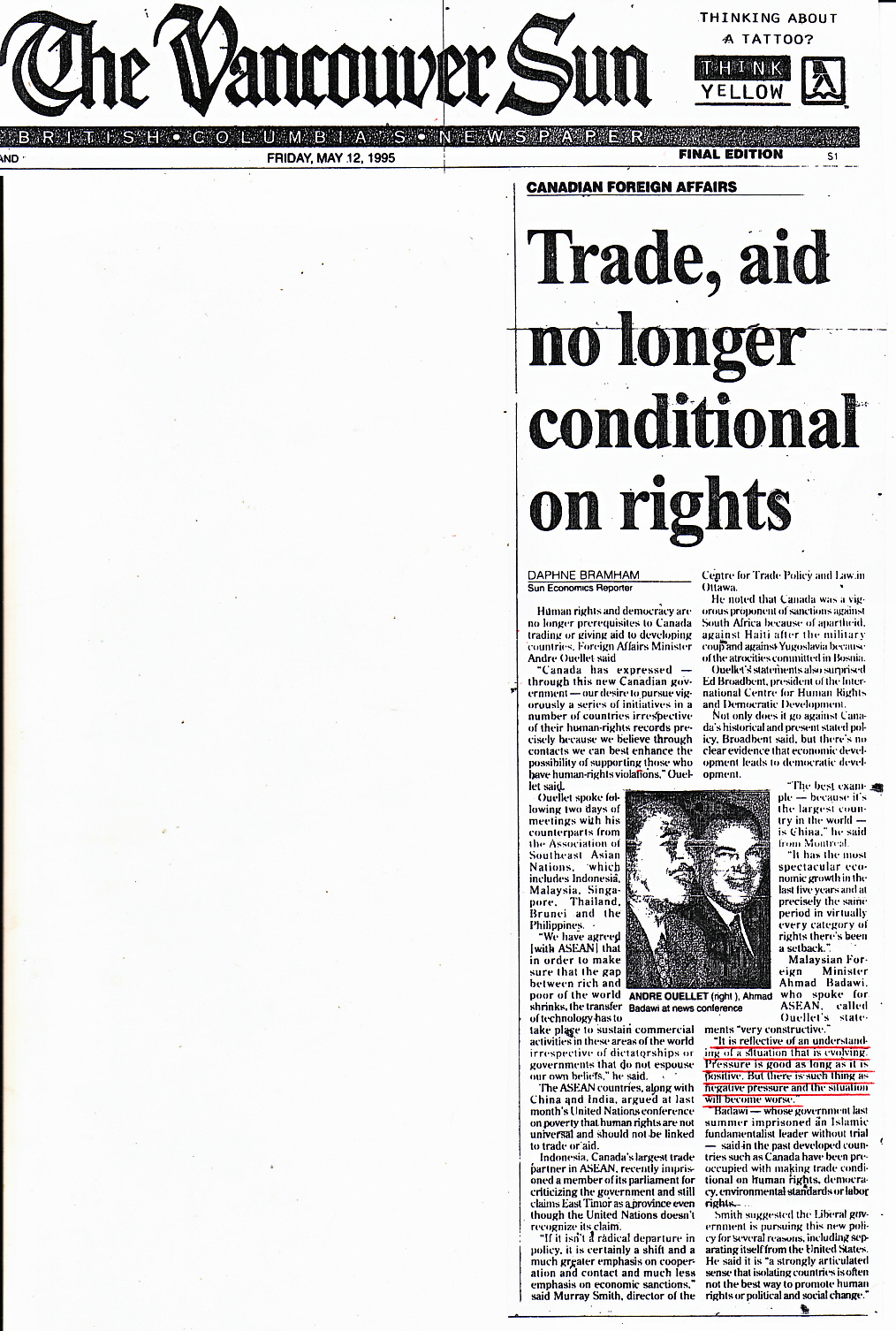

DAPHNE BRAMHAM
SUN Economics Reporter
Human rights and democracy are no longer prerequisites to Canada trading or giving aid to developing countries, Foreign Affairs Minister Andre Ouellet said Thursday.
"Canada has expressed--through this new Canadian government--our desire to pursue vigorously a series of initiatives in a number of countries irrespective of their human-rights records precisely because we believe through contacts we can best enhance the possibility of supporting those who have human-rights violations," Ouellet said.
Ouellet spoke following two days of meetings with his counterparts from the Association of Southeast Asian Nations, which includes Indonesia, Malaysia, Singapore, Thailand, Brunei and the Philippines.
"We have agreed (with ASEAN) that in order to make sure that the gap between rich and poor of the world shrinks, the transfer of technology has to take place to sustain commercial activities in these areas of the world irrespective of dictatorships or governments that do not espouse our own beliefs," he said.
The ASEAN countries, along with China and India, argued at last month's United Nations conference on poverty that human rights are not universal and should not be linked to trade or aid.
Indonesia, Canada's largest trade partner in ASEAN, recently imprisoned a member of its parliament for criticizing the government and still claims East Timor as a province even though the United Nations doesn't recognize its claim.
"If it isn't a radical departure in policy, it is certainly a shift and a much greater emphasis on cooperation and contact and much less emphasis on economic sanctions," said Murray Smith, director of the Centre for Trade Policy and Law in Ottawa.
He noted that Canada was a vigorous proponent of sanctions against South Africa because of apartheid, against Haiti after the military coup and against Yugoslavia because of the atrocities committed in Bosnia.
Ouellet's statements also surprised Ed Broadbent, president of the International Centre for Human Rights and Democratic Development.
Not only does it go against Canada's historical and present stated policy, Broadbent said, but there's no clear evidence that economic development leads to democratic development.
"The best example--because it's the largest country in the world--is China," he said from Montreal.
"It has the most spectacular economic growth in the last five years and at precisely the same period in virtually every category of rights there's been a setback."
Malaysian Foreign Minister Ahmad Badawi, who spoke for ASEAN, called Ouellet's statements "very constructive."
"It is reflective of an understanding of a situation that is evolving. Pressure is good as long as it is positive. But there is such thing as negative pressure and the situation will become worse."
Badawi--whose government last summer imprisoned an Islamic fundamentalist leader without trial--said in the past developed countries such as Canada have been preoccupied with making trade conditional on human rights, democracy, environmental standards or labor rights.
Smith suggested the Liberal government is pursuing this new policy for several reasons,
including separating itself from the United States. He said it is "a strongly articulated
sense that isolating countries is often not the best way to promote human rights or political
and social change."
(text of May 12, 1995 Vancouver Sun front-page headline article)
BACK TO THE BRIEF SIDESTEPS TO THE EXPLANATION OF 'WHO HE IS'?